Though the CW’s new Kung Fu reimagining (created by Hawaii Five-0 writer Christina Kim) doesn’t explicitly reference the 1972 series it’s loosely based on, you don’t have to look particularly hard to see how it’s actively trying to reclaim aspects of Chinese culture that the original show reduced to set dressing styled to glorify David Carradine.
The original Kung Fu’s title alone spoke volumes about what sort of social climate and pop-cultural mores led to the creation of a TV show starring a white man playing a biracial Chinese man that ran for three seasons on ABC. The original Kung Fu’s centring of whiteness and overt cultural appropriation were glaring marks against it that were only further highlighted by stories like The Karate Kid and Cobra Kai that drew inspiration from it. In place of Carradine’s Kwai Chang Caine, the orphaned son of a Chinese woman and an American man who sets out on an adventure through the Old West as he searches for his long-lost half brother, the new Kung Fu tells the story of Nicky Shen (Legacies’ Olivia Liang), a Chinese American 20-something whose path to heroism begins with a heartfelt realisation about her needs.
The CW’s Kung Fu establishes early in its first episode that while Nicky’s estranged from her family, her emotional connection to them runs quite deep. It’s something that made it much more difficult for her to run away from them after she realised her mother’s true motive in sending her on a trip was matchmaking with the hope of a quick marriage. In a flashback set three years in the past, Nicky’s split-second decision to flee a night of matchmaking brought her face-to-face with a woman named Pei-Ling (Vanessa Kai) who immediately understood why a young woman might want to flee a life of pre-planned domesticity insisted upon by her parents
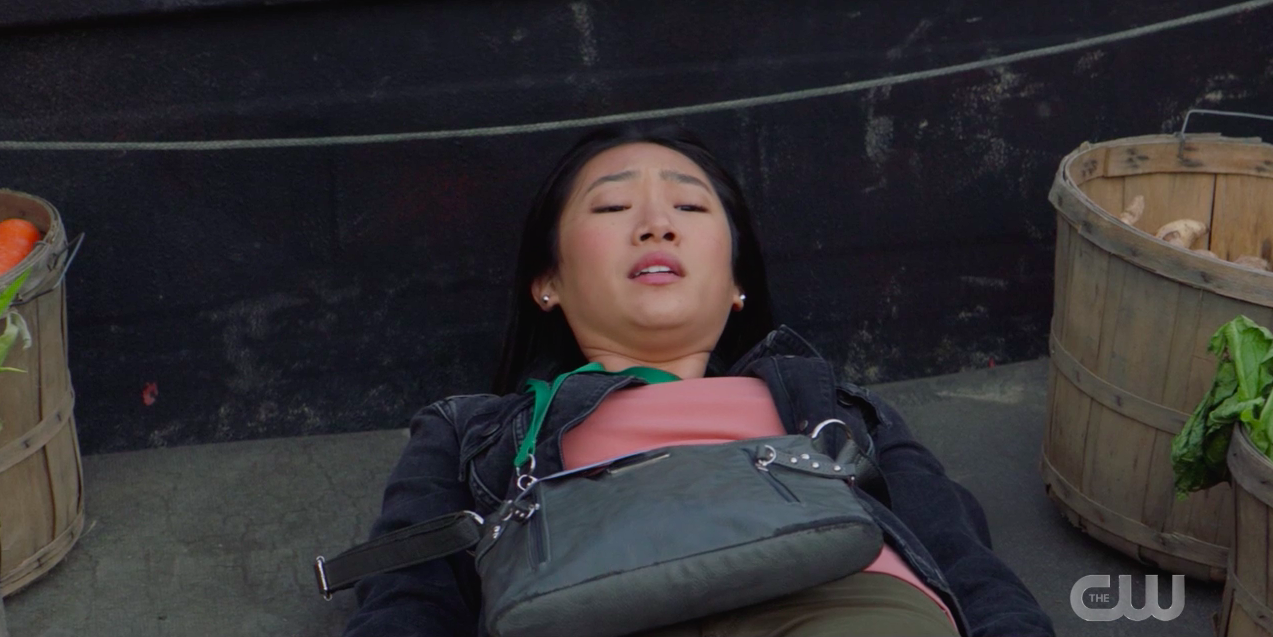
In Nicky, Pei-Ling saw shades of herself, and the younger woman’s burgeoning potential for greatness that was only being held back by her uncertainty about her future. Kung Fu breezes through this bit of Nicky’s backstory in order to show you how quickly she became acclimated to life at a monastery in the Yunnan Province where Pei-Ling trained a number of girls in Shaolin kung fu. The speed with which Nicky becomes one of the stronger students works to keep Kung Fu’s story moving at a brisk pace, but it’s also one of the show’s first ways of cluing you in to how she’s destined for greatness. It’s something her Shifu never fully gets to tell her before she’s murdered in a sudden attack by a woman named Zhilan (Yvonne Chapman).
When Nicky stumbled upon Zhilan, she couldn’t have possibly understood what the killer wanted with the mysterious sword she stole from the monastery and used to murder Pei-Ling. Strange as the sword (which somehow burns Nicky’s hand when she touches its hilt) is, Zhilan’s intention to kill Nicky made survival her top concern in that moment. It’s only through sheer luck — or perhaps destiny — that she’s able to survive a near-deadly fall off a cliff after the would-be assassin chases her down. The entire ordeal is what prompts Nicky to flee China and return to her home in San Francisco.
Formulaic as much of Kung Fu’s premise is, what really sets the show apart is its distinct goal of treating its characters with a level of thoughtfulness and attention to detail that’s seldom afforded to productions with predominantly Asian casts, which continue to be a rarity on network television. As much emotional distance as there is between Nicky and her mother Mei-Li (Tan Kheng Hua), Kung Fu takes care to illustrate the emotional reasoning behind why the women don’t see eye-to-eye in order to avoid depicting them as having a stereotypical domineering parent/stifled child dynamic. Anxious as her family makes her, Nicky never wavers in her belief that she should be the arbiter of her own future, particularly when it comes to intensely personal things like who she dates. Hostile as Mei-Li is towards Nicky when she shows up out of the blue, it never comes from a place of outright disdain for her daughter, but rather a desire to shield her from all of the secrets that she and her kind-hearted restaurateur husband, Jin (Mulan’s Tzi Ma), have been hiding from their children.
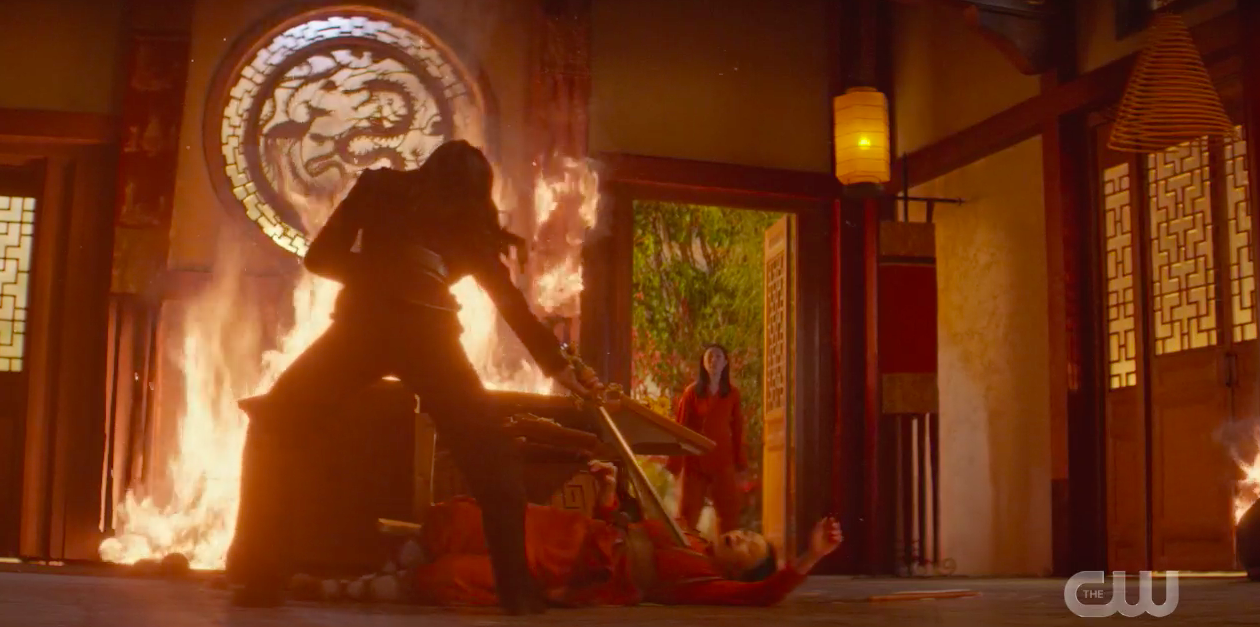
In sharp contrast to the impression his wife’s reaction gives off, Jin sees his daughter’s return as the first step in healing some of the anger that’s been simmering in their family in the years since Nicky dropped out of school to become a monk — and her siblings feel more or less the same. The show explores the regret Nicky feels for leaving her family behind by making clear just how much of her older sister Althea’s (Shannon Dang) and her younger brother Ryan’s (Jon Prasida) lives she’s missed out on. Where Nicky sprinted away from the very thought of marriage, she comes home to find Althea elated and in the throes of planning her own upcoming wedding. Unlike her sister, who has an easy time immediately welcoming Nicky back, Ryan lets her know how much it hurt for her, the only person in the family who knew that he was gay at the time, to abandon him. Both of Nicky’s siblings have a comparatively easier time picking things back up with her than their mother; that sets the stage for them becoming her invaluable support team as the troubles she thought she’d left behind in China just so happen to follow her home.
Before Kung Fu fully begins to lean into its street-level vigilante rhythm, it first introduces Nicky’s ex-boyfriend, Evan Hartley (Gavin Stenhouse), an assistant district attorney and one of the series’ few significant white characters. Evan’s complicated feelings about Nicky’s return are rooted both in their romantic past and the cultural divide Kung Fu’s none too subtle about nodding to as a potential source of emotional struggle for the both of them.
As much energy as the show puts into centring Nicky’s story and working to distinguish itself from the original Kung Fu, there are a number of moments — generally when white characters are present and whiteness comes up in conversation — when it feels uncertain as to how hard it wants to go in acknowledging the realities of how race and class function in America. Like Nicky’s siblings, Evan also becomes an ally in her fight against evil in San Francisco. But Kung Fu leading with the idea of its heroine relying on the assistance of a white lawyer with connections in the local police department feels somewhat at odds with the way the show reminds you how the kind of terror that begins to plague her local community has historically been the result of people like Evan failing to become involved in a meaningful way.
Interestingly, Evan is the first person that Nicky tells about what happened in the monastery — including how some of what happened in the fight appeared to be borderline-magical. What little question there was about whether Kung Fu is a genre series or not evaporates once Pei-Ling’s ghost begins appearing to our young hero in visions encouraging her to push through the present turmoil she’s experiencing in order to heal her family bonds and embrace her fate. The story further complicates Nicky’s journey by showing her that walking the path Pei-Ling’s ghost insists lays before her is still perilous, something she learns as she arrives at her family’s restaurant just in time to witness someone attacking her father.
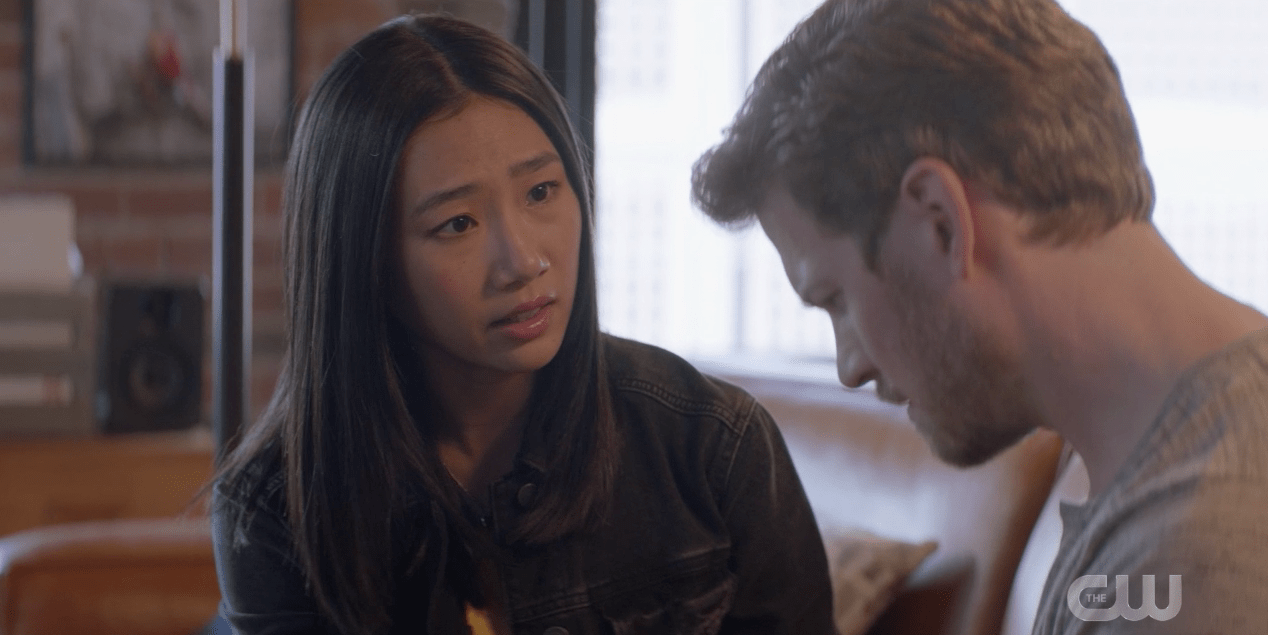
Kung Fu taps into many elements of superhero storytelling, but secret identities aren’t exactly one of them, since Nicky considers herself to be a regular person who is highly trained in a special form of spirituality that also features martial arts. Nicky’s visions of Pei-Ling, her previous encounter with Zhilan, and her lingering questions about the stolen sword make it impossible for her to rule out the possibility that there’s more to the blade and the myths attached to it.
Thankfully, it’s something she begins to learn more about with the help of Henry Yan (Eddie Liu), a Chinese folklore and history expert. Between cryptic conversations with Pei-Ling’s spirit and Henry’s research, Nicky soon begins to understand how the sword gained its legendary status centuries ago after it was first picked up by a woman named Liang Daiyu who drove raiders away from her village when no one else could. While Nicky still has some doubts as to the legends’ telling of the sword’s magical properties, she can’t deny that people interested in it have become a clear danger to her personally, and this all works as Kung Fu’s way of presenting Nicky’s story as the continuation of an in-universe mythological legacy.
What seems at first like it may simply be Zhilan having attempted to further stalk Nicky actually turns out to be her father suffering the consequences of the family’s financial involvement with Triad boss Tony Kang (Tristan Liu). Uncertain as Nicky’s been about the complications related to her Shaolin life, organised crime’s something she can more easily wrap her mind around, and Kung Fu finds its stride once it sets her and her siblings on a path to taking on the Triad.
Kung Fu’s creative team clearly understood that the show’s fighting sequences were something that absolutely could not be slipshod — something that very easily could have been a possibility given that this is the CW, where exceptional choreography is the exception rather than the rule. Through its dramatic use of wirework and fights that focus more on skill than spectacle, Kung Fu’s action sets itself apart from a lot of other shows that similarly feature martial arts. At the same time, it tries to keep you guessing as to just how magical the show really is.
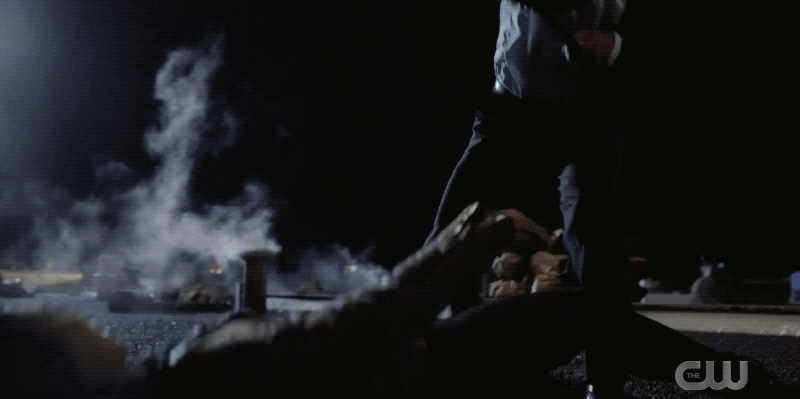
By comparison, Kung Fu’s second episode, “Silence,” eases up in terms of how much worldbuilding it attempts to do, which works to the episode’s benefit as it delves into what being back home with her family will mean for Nicky. After an unsettling dream in which all of her family members are eerily fine with her having dropped out and run off, she awakes to find that her waking world’s still a bit prickly when her mother’s around. As Mei-Li sees it, Nicky’s return home is going to be temporary at best and tied to the simple fact that, after whatever happened in China, her daughter simply had no place else to go. She’s not really all that wrong, and both she and Nicky know it.
But rather than immediately confronting her mother about the tensions between them, Nicky instead seeks counsel and comfort in Evan once again. When Evan runs into Nicky as he’s out for one of his usual jobs, he’s right to point out how slightly aggressive her constantly showing up unannounced is when she knows that people have their own lives. But he has an empathetic ear as she explains her most recent dreams to him, and he reasons that it might be her mind’s way of pushing her to engage more directly with her family.
Dreams feature largely throughout moments when Nicky slips into a meditative state to help clear her mind, and she seems to gain the ability to essentially summon Pei-Ling at will. In other visions, Nicky’s able to recall or at least perceive things about Zhilan that she wasn’t aware of before, and when she catches a glimpse of an intricate necklace belonging to the assassin, she reasons that it might be another clue to tracking her down. This newfound ability to glean important pieces of the larger picture works as the second episode’s way of giving her more of a reason to interact with Henry, who’s shaping up to be one of Nicky’s most formidable allies both because of his knowledge and his own martial arts skills. Of course, you can also see how the series is setting up a love triangle between Nicky, Henry, and Evan down the line that’s likely to become more prominent as the heroes get closer to facing off against the Triad and Zhilan.
“Silence” is careful to make Nicky’s family life just as important as her heroism, though, as her duties as a participant in Althea’s wedding pull her away from her hunt and force her to let her siblings in on more of her past at the monastery. Balancing her life becomes even more complicated after she misses an appointment to train in the park with Henry, and ends up deciding to get involved in the personal drama of a young, unhoused girl named Ronda (Amanda Fix) and her mother Carmen (Debbie Podowski), who’ve found themselves in a difficult situation. After saving the pair from a mugger armed with a gun, Nicky doesn’t know why Ronda grabs the weapon and runs away with it, but Pei-Ling’s ghost encourages her to follow them.
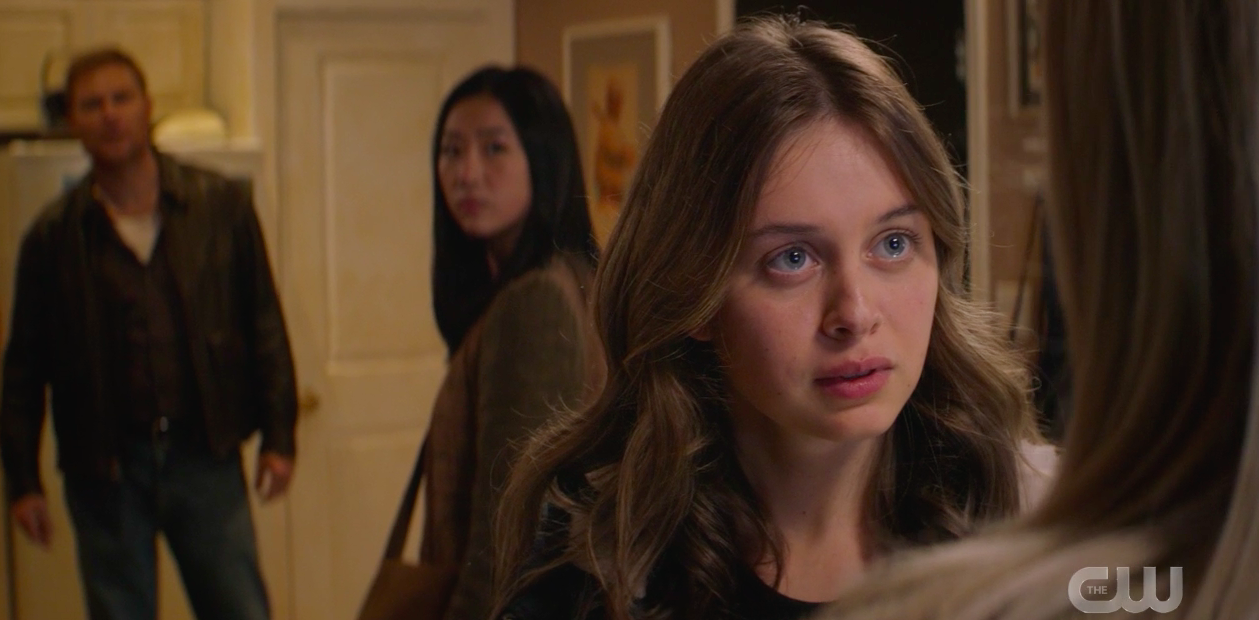
What Nicky ends up learning — after Ronda pulls the gun on her — is that while Ronda very much wants to be with her mother, Carmen refuses to leave her abusive boyfriend Derek (Link Baker), who keeps the family in constant economic troubles that make their home unstable. Though Nicky’s got plenty of problems on her own plate already that have nothing to do with these strangers, she takes it upon herself to help Carmen and Ronda get on their feet in a series of events that take her across town and end up with her having to bust up a private gambling tournament in order to get the family’s stolen money back from Derek. It all works to illustrate what sort of hero Nicky already is at the top of Kung Fu, but it also highlights how questionably Nicky’s time management skills are.
“Silence” closes out with a handful of revelations that further strengthen Nicky’s resolve — most notable among them being that Zhilan is actually Pei-Ling’s sister. In the grand scheme of things, though, the fact that the legendary sword is only one of eight supposedly magical weapons is the big chunk of important plot that the episode leaves you with, and it gives you a clear view of what’s next for Nicky. Not only are there eight weapons, but there are eight different families tasked with guarding them. Nicky might not yet know who they all are or whether they know they’re in danger, but as Kung Fu progresses, they’re certain to find out.
Kung Fu is set to air on Binge in Australia, but no release date has been confirmed yet.
